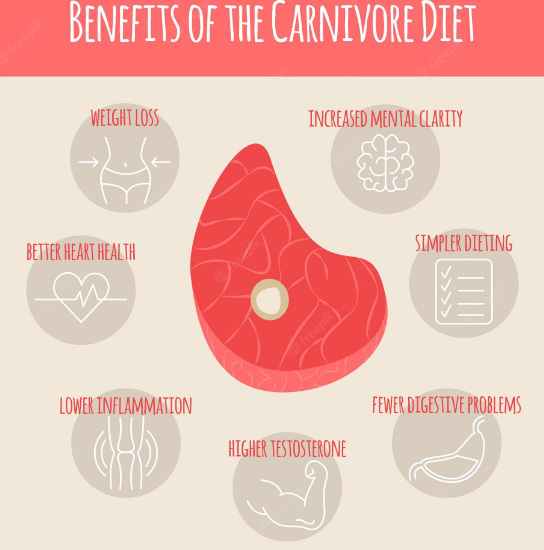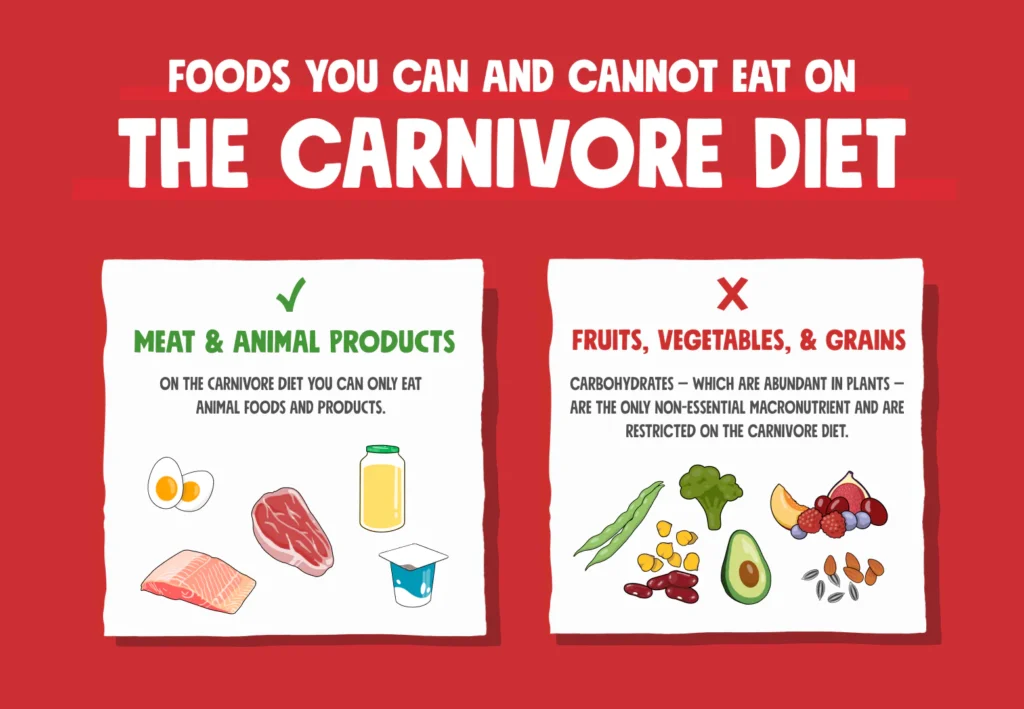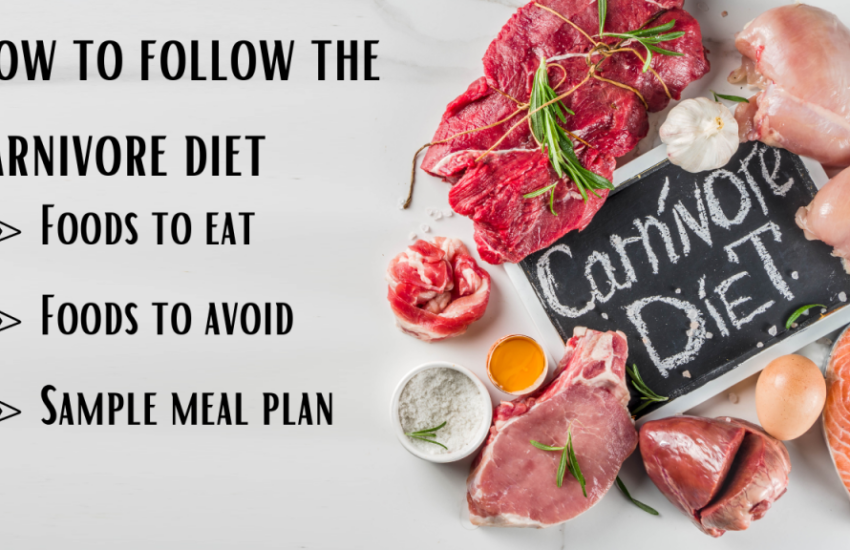
The carnivore diet weight loss plan has gained popularity in recent years as a means of achieving rapid fat loss. This diet consists entirely of meat and beast products, banning all other foods, like fruits, vegetables, legumes, grains, nuts, and seeds. But how effective is the carnivore diet for weight loss, and what are the implicit benefits and downsides?
In this comprehensive companion, I will explore all aspects of the carnivore diet and its impact on weight loss.
Overview of the carnivore diet
The carnivore diet is a restrictive diet that only includes meat, fish, and other beast foods like eggs and certain dairy products. This diet all other foods, fruits, vegetables, legumes, grains, nuts, and seeds. Proponents of the carnivore diet claim that it can prop in weight loss, mood issues, and blood sugar regulation, among other health issues. still, the diet is extremely restrictive and likely unhealthy in the long term.
While the carnivore diet also aims for ketosis, it completely eliminates carbohydrates from the diet. This makes it more restrictive than the keto diet. Result, the carnivore diet may lead to faster initial weight loss, but it will be more difficult to maintain long-term. Furthermore, the lack of research on the carnivore diet makes it difficult to determine long-term effects on weight loss and health.

Benefits of the carnivore diet for weight loss
Increased energy
The carnivore diet may provide increased energy levels due to the body being in a state of ketosis and relying on ketones for fuel. High carbohydrate foods will cause spikes in blood sugar, leading to feelings of fatigue and tiredness. Since the carnivore diet contains zero carbohydrates, followers of the diet often report an increase in energy.

Less hunger

Mental clarity

Thermic effect of food

Downsides of the carnivore diet
High in fat, cholesterol, and sodium
Saturated fat and cholesterol are abundant in the carnivore diet, that can raise LDL (bad) cholesterol levels and raise the risk of heart disease. Bacon and breakfast meats, among other processed meats, contain a lot of sodium, that can cause kidney disease and high blood pressure.
Lack of certain micronutrients and plant compounds
The carnivore diet eliminates many nutrient-rich foods like fruits, vegetables, and whole grains. Meat is good source of micronutrients, relying solely on animal products will result in nutrient deficiencies or imbalances.
Fiber, an essential component for gut health and bowel function, is only found in plant foods. The carnivore diet contains no fiber, which may lead to constipation and negatively impact gut health.
Not suitable for some populations
The carnivore diet will not be suitable for certain populations, like individuals with chronic kidney disease, cholesterol hyper-responders, children, pregnant or lactating individuals, and those with a history of disordered eating.
How to follow the carnivore diet

To follow the carnivore diet, one must eliminate all plant-based foods and focus on consuming meat, fish, eggs, and small amounts of low-lactose dairy products. There are no specific guidelines regarding calorie intake, serving sizes, or meal timing; most proponents of the diet recommend eating as often as desired.
Foods to eat on the Carnivore diet
The following animal products are allowed on the carnivore diet.
- Meat: beef, chicken, turkey, organ meats, lamb, pork, etc.
- Fish: salmon, mackerel, sardines, crab, lobster, tilapia, herring, etc.
- Other animal products: eggs, lard, bone marrow, bone broth, etc.
- Low-lactose dairy (in small amounts): heavy cream, hard cheese, butter, etc.
- Water
Salt, pepper, and carb-free seasonings may also be permitted.
Foods to avoid on the carnivore diet
All plant-based foods are excluded from the carnivore diet, including.
- Vegetables: broccoli, cauliflower, potatoes, green beans, peppers, etc.
- Fruits: apples, berries, bananas, kiwi, oranges, etc.
- High-lactose dairy: milk, yogurt, soft cheese, etc.
- Legumes: beans, lentils, etc.
- Nuts and seeds: almonds, pumpkin seeds, sunflower seeds, pistachios, etc.
- Grains: rice, wheat, bread, quinoa, pasta, etc.
- Alcohol: beer, wine, liquor, etc.
- Sugars: table sugar, maple syrup, brown sugar, etc.
- Beverages other than water: soda, coffee, tea, fruit juice, etc.
Sample meal plan for the carnivore diet

Here is a five-day sample meal plan for the carnivore diet.
Day 1
- Breakfast: eggs, bacon, sardines
- Lunch: turkey burger patty, salmon jerky, beef tips
- Dinner: filet mignon, crab, chicken liver
- Snacks: a small amount of Parmesan cheese, jerky
Day 2
- Breakfast: shrimp, eggs, a small glass of heavy cream
- Lunch: strip steak, tuna fish, beef jerky
- Dinner: lamb chops, scallops, beef liver
- Snacks: a small amount of hard Cheddar cheese, bone broth
Day 3
- Breakfast: eggs, salmon, turkey sausage
- Lunch: beef tips, pork chops, mackerel
- Dinner: turkey burger patty, a small amount of Parmesan cheese, bone marrow
- Snacks: hard-boiled eggs, shrimp
Day 4
- Breakfast: trout, shredded chicken, bacon
- Lunch: beef meatballs, a small amount of Cheddar cheese, salmon jerky
- Dinner: crab cooked in lard, filet mignon
- Snacks: sardines, beef jerky
Day 5
- Breakfast: eggs, chicken and turkey sausage links
- Lunch: lamb roast, chicken liver, pork chop
- Dinner: flank steak, scallops cooked in butter, a small glass of heavy cream
- Snacks: bone broth, turkey jerky
How long can you stay on the carnivore diet?

There’s no definitive answer to how long bone can stay on the carnivore diet, as it varies from person to person and depends on individual pretensions and health. still, the restrictive nature of the diet may make it delicate to maintain long- term, and it’s essential to pay close attention to any implicit nutrient scarcities or adverse health goods. It’s recommended to consult with a healthcare professional before embarking on the carnivore diet and to cover your health regularly.
Carnivore diet weight loss: The bottom line
The carnivore diet weight loss plan may lead to short-term weight loss due to its restrictive nature and elimination of carbohydrates. The diet comes with potential downsides, like nutrient deficiencies, lack of fiber, and potential health risks.
Some individualities will witness success with the carnivore diet, it’s essential to consider other, more sustainable and well- delved diets, similar as the ketogenic diet or a balanced diet with a variety of healthy foods. Always consult with a healthcare professional before starting any new diet plan to insure it’s safe and suitable for your individual requirements.

